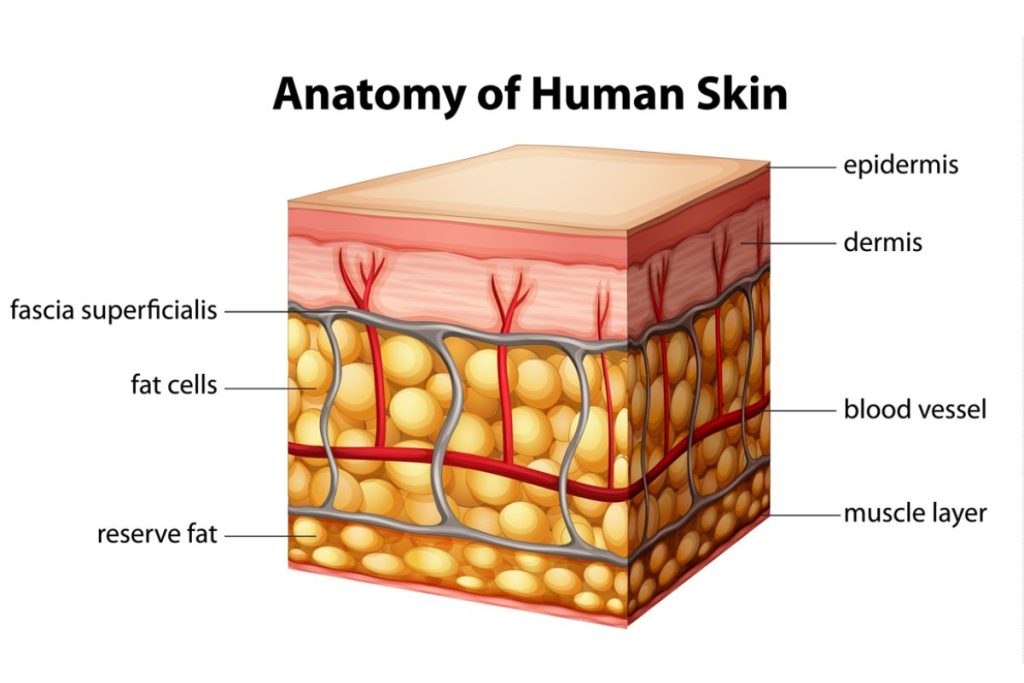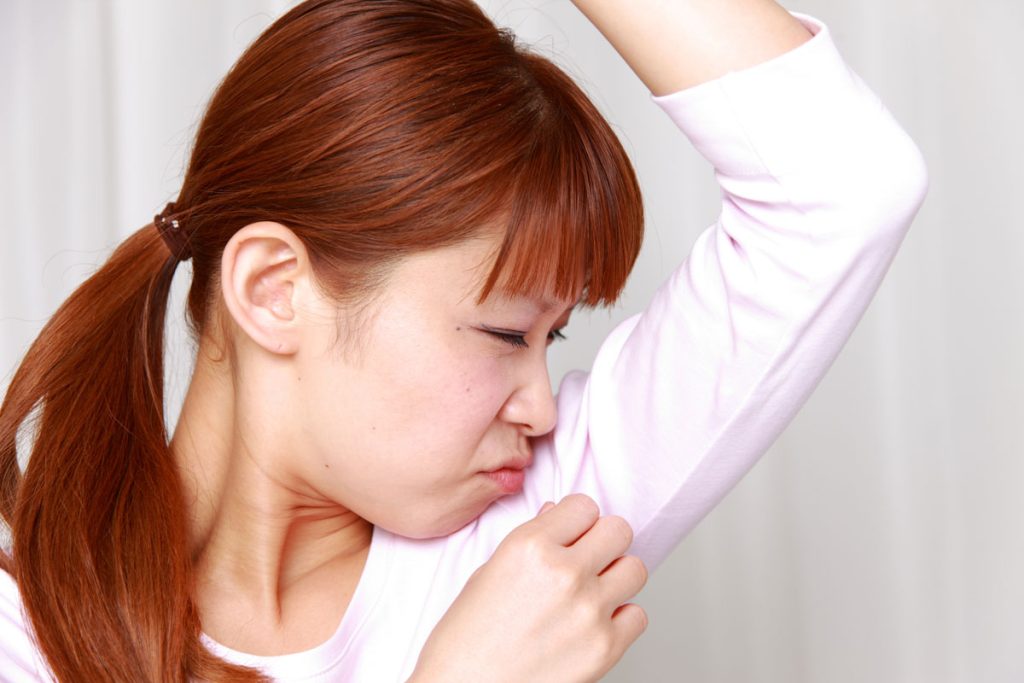You’re not sure what that smell is, or where it’s coming from. You take another few deep breaths and realize with horror that the strange body odor – tangy? more like dead fish? smelly urine? – is coming from your own body. You wonder what the heck is going on, as you just showered and put on deodorant. It’s not necessarily your imagination…or a sign of a health condition. Menopause body odor, even a change in your vaginal odor, is a thing. Female body odor can change with age. You’re not going crazy, and you’ll find below 10 things you need to know and how to manage the smell.
Menopause-related body odor
One of the hints that you may be on the menopause journey may be a change in your natural body odor. Every journey is different, so some women+ experience unusual body odor while others don’t.
You’ve heard from some of your friends who are going through menopause that they are smelling similar things on themselves these days. You are a woman in her 40s or 50s (or even younger for those with premature or early menopause) on the menopause journey, so maybe it’s happening to you too.
It’s not unusual for the smell of a woman’s body to change during the menopause journey. We’ve heard women say their sweat seems to smell more intense, and they smell something “off,” even when they’re not sweating.
Menopause smell
For some women+ there is a strange smell to menopause.
The smells women+ mention include:
- Acidic
- Fruity
- Fishy (dead fish too)
- Sweaty
- Tangy
Some women+ describe the smell as gross. You can smell it on your body, vagina, or urine.
While the urine smell is unrelated to the body odor, it’s a smell, nonetheless. Women describe their urine as smelling like ammonia.
These pungent smells may be a sign you’ve started the menopause journey.
Menopause and vaginal odor
In addition to overall body odor, do you also have an unpleasant or just different odor in your vagina?
The changes in hormone levels that come with menopause can lead to changes in the vagina’s normal scent and overall health, including changes in the vagina’s pH and glucose levels. This can lead to thinner, drier vaginal tissue and changes in the bacteria that populate the vagina (the vaginal microbiome). For some women, this leads to vaginal odor or changes in the scent of their vaginas.
If you have a bad odor in the vagina area, it could also be a sign of other health conditions, like a bacterial infection called bacterial vaginosis. Your vagina’s microbiome changes during the various stages of your life, from puberty to menopause and beyond.
Talk with your doctor if you have a bad vaginal odor or vaginal pain, as it may be a sign of something else in addition to or instead of the hormonal transition.
Does menopause cause body odor?
Hormone fluctuations are a key part of the menopause transition and can cause many menopause-related symptoms like hot flashes, night sweats, sleeplessness, and leg pain.
Changing and volatile hormone levels and body odor tend to go together. Body odor is also linked to other hormonal symptoms like hot flashes.
However, hormones are not the only reason why your body might smell differently to you.
There are at least 5 potential reasons for body odor during your menopause journey.
1. More sweat from hormonal imbalances.
2. Stronger body odor from different proportions of hormones.
3. More anxiety.
4. Not drinking enough water.
5. Changes in your sense of smell.
Up to 80% of menopausal women have vasomotor symptoms
1. Female hormone imbalance can cause more sweat and body odor.
Do you have hot flashes or night sweats (vasomotor symptoms)? If so, you may also notice a new or different body odor. It’s closely linked to hot flashes, and unbalanced hormones are often the cause of these menopause symptoms.
Up to 80% of menopausal women experience vasomotor symptoms, i.e., hot flashes, night sweats, and palpitations. These symptoms are believed to be caused by a combination of lower estrogen levels and levels that bounce around (until they settle down in the post-menopause stage of the journey).
With hot flashes and night sweats, you’re obviously sweating more, which means you may smell more. You may find yourself sweating under your breasts, in your armpits, or over other parts of your body too. Sweat itself doesn’t smell, but when combined with the bacteria on your skin, the result can be a noticeable odor.
The components of your sweat and the make-up of your skin microbiome can also change in response to hormonal changes.
2. Different proportions of hormones, stronger body odor.
During the menopause transition, estrogen and progesterone levels fall. Testosterone also continues falling, a process which begins in your 20s. On the other hand, cortisol (stress hormone) levels tend to increase.
When you put all these changes together, you have higher relative levels of cortisol and testosterone compared to estrogen and progesterone. The result? Stronger odor.
3. More anxiety, more sweat, more smell.
Menopause tends to be a time of higher stress and anxiety, as you try to figure out what’s going on with your body, your mind (e.g., problems concentrating), and your emotions. You may experience symptoms like brain fog or mood swings for the first time in your life. For some women, it feels like an emotional rollercoaster. That’s why menopause is sometimes called the second adolescence.
Take comfort in knowing this isn’t your first (hormonal) rodeo! In some ways, the menopause journey is like a second adolescence. You made it through your teen years, and you can do it again!
Also, remember the stress hormone, cortisol, is on the rise during menopause. So, it’s no wonder you may feel some degree of overwhelm.
Anxiety can make you sweat more. This type of sweat can have a more unpleasant smell than sweat from being warm or exercising. Anxiety sweat is produced by the apocrine glands, which are in your armpit and groin areas, while general sweat emanates from the dermis layer of the skin and comes through the pores in your skin.

4. Not drinking enough water?
If you’re dehydrated and sweating, your sweat could smell more pungent than when you’re fully hydrated. Night sweats and hot flashes can lead to dehydration if you don’t replace what you’re losing, especially if your consumption of fluids chronically runs less than recommended.
And if your caffeine intake has increased to try to overcome brain fog or insufficient sleep, that may contribute to dehydration because caffeine can have a mild diuretic effect. Additionally, if you’re self-medicating with alcohol, that can be dehydrating also.
5. Your sense of smell might be changing.
Some women say their sense of smell heightens as they go through menopause, and they smell things they didn’t notice before. Or things smell differently than they did prior to starting the menopause journey. If your sense of smell changes, you may think you smell bad, even if you don’t.

How to treat menopause body odor
Whether the smell is an overall body odor or it seems to be coming from your vagina, there are 5 ways to help decrease and maybe even eliminate new or changed body odor.
Most of these target one of the main culprits, hot flashes and night sweats.
1. Decrease your stress with mind-body techniques.
Less stress can mean less sweat. Even just a few minutes a day of mind-body practices like meditation, yoga, walking, etc., can help quiet your mind and reduce your anxiety.
By focusing on the connection between your mind and body, you may also help other menopause symptoms. For example, some research shows that meditation and hypnotherapy can help decrease hot flashes.
Try these self-care strategies to de-stress or these anxiety treatment options.
2. Personal hygiene
During the menopause journey, you may need to shower or take a bath more often to help clear your skin of sweat and the odor that comes with it.
Cleansing wipes can also come in handy. If you plan to use wipes in your vaginal area, be sure they’re pH balanced and moisturizing, with ingredients like aloe and vitamin E.
And don’t forget about deodorant and an antiperspirant. The antiperspirant helps reduce sweat, and the deodorant helps fight the odor.
3. Change what you drink and eat.
Limit your intake of alcohol and caffeinated beverages, which can dehydrate you, and spicy foods if they usually make you sweat or have a hot flash. There are several foods to avoid if hot flashes are an issue.
Focus on foods that can improve how you feel during menopause and limit those that cause symptoms.

Make A Change For The Better!
This menopause grocery list contains a combination of foods specifically selected to help you feel better today and even better in the future.
"*" indicates required fields
4. Try hormone therapy
You can also treat menopause body odor with hormone therapy (HT) because it can help you manage menopausal hormonal changes that cause odor-inducing menopause symptoms like hot flashes and night sweats.
HT can also improve other menopause symptoms like vaginal dryness and sleeplessness. It can also reduce the risk of osteoporosis.
Talk with your doctor about HT and whether the benefits are worth the risks for your personal situation. The choice should be individualized, not a one-size fits all prescription.
5. Try non-hormonal approaches to manage symptoms
If you don’t want to take hormones or can’t take them, you can also try non-hormonal prescription medications and techniques to manage symptoms that cause body odor.
Paroxetine (Brisdelle®) is a non-hormonal drug approved by the Food and Drug Administration (FDA) to treat vasomotor symptoms, including hot flashes and night sweats.
Doctors also prescribe women+ off-label drugs for hot flashes, including antidepressants and gabapentin, an anti-seizure medication.
You can also talk to an herbalist, naturopathic, or integrative physician about herbal remedies for hot flashes. The pausitive health herbal guide includes the latest herbal research and recommendations from international menopause societies.
Women also use non-hormonal approaches, many of which pausitive health informs you about, like:
- probiotics
- acupuncture
- massage
- reflexology
- qigong
- yoga
- paced breathing
- meditation
- guided imagery
- hypnotherapy
- Emotional Freedom Technique (EFT) or tapping Cognitive Behavioral Therapy (CBT)
- music
- nutrition
6. Try “cooling” devices and gadgets
Many women+ also add the following menopause hacks to decrease hot flashes and night sweats, and, as a result, body odor:
- Fans and cooling sprays
- Cooling pillows, linens, and mattress covers
- Cooling towels
- Neck cooling tubes
- Wearables like the ThermaBand and the EMBR Wave
ThermaBand was designed by a mother and daughter team. The device allows you to adjust your temperature on demand or the device can automatically adjust as needed.
Embr Wave® is also a wearable delivering personal cooling or warming.
7. Choose your fabrics carefully.
Natural, breathable fabrics like cotton, linen, and bamboo are a better choice than synthetic ones, which are more likely to trap body heat.
Exercise a lot? Look for “wicking” fabrics that pull moisture away from your skin to keep you cool and less smelly.
Also, wear loosely fitting clothing.
It’s not just what you wear that matters, but the type of fabrics of your bed sheets. Try cooling pillows, linens, and mattress covers.

Time for a change for the better
Changes in body odor during the menopause journey can sometimes feel embarrassing if your sense of smell has become very acute. You may smell something others don’t find offensive or notice at all.
Many symptoms experienced during the menopause transition are similar to those related to possible health conditions. So, discuss your concerns with your healthcare practitioner to make sure there aren’t other possibilities that should be explored, such as diabetes and kidney problems.
Lastly, take the time to understand the potential sources of that new or different scent.
Embrace the change that menopause brings. It’s often a time of renewed self-awareness of your body. Make a change for the better so symptoms like vaginal and overall body odor don’t control you during the journey and hold you back from living your life.
Remember, this change, along with so many others during menopause, usually abate or disappear on the other side of the journey.
Phillips IR, Shephard EA. Primary Trimethylaminuria. 2007 Oct 8 [updated 2020 Nov 5]. In: Adam MP, Mirzaa GM, Pagon RA, Wallace SE, Bean LJH, Gripp KW, Amemiya A, editors. GeneReviews® [Internet]. Seattle (WA): University of Washington, Seattle; 1993–2023. PMID: 20301282.
Amabebe E, Anumba DOC. The Vaginal Microenvironment: The Physiologic Role of Lactobacilli. Front Med (Lausanne). 2018 Jun 13;5:181. doi: 10.3389/fmed.2018.00181. PMID: 29951482; PMCID: PMC6008313.
Avis NE, Crawford SL, Green R. Vasomotor Symptoms Across the Menopause Transition: Differences Among Women. Obstet Gynecol Clin North Am. 2018 Dec;45(4):629-640. doi: 10.1016/j.ogc.2018.07.005. Epub 2018 Oct 25. PMID: 30401547; PMCID: PMC6226273.
You may also like…

Hot Flash Guide: Why They Happen and How to Get Relief
Hot flashes are one of the most common and disruptive symptoms, but they they can feel isolating and even embarrassing. Understand what’s happening in your body and learn about new treatment options.

LYNKUET: A New Option for Hot Flash Relief
A new non-hormonal medication, LYNKUET™ (elinzanetant) offers relief for women+ who experience menopause-related hot flashes. Learn how it works.

Hormone-Free Hot Flash Relief: 12 Non-Hormonal Medications To Try
Want to beat the heat from hot flashes hormone-free? Try these non-hormonal hot flash medications that are FDA-approved or used off-label.

